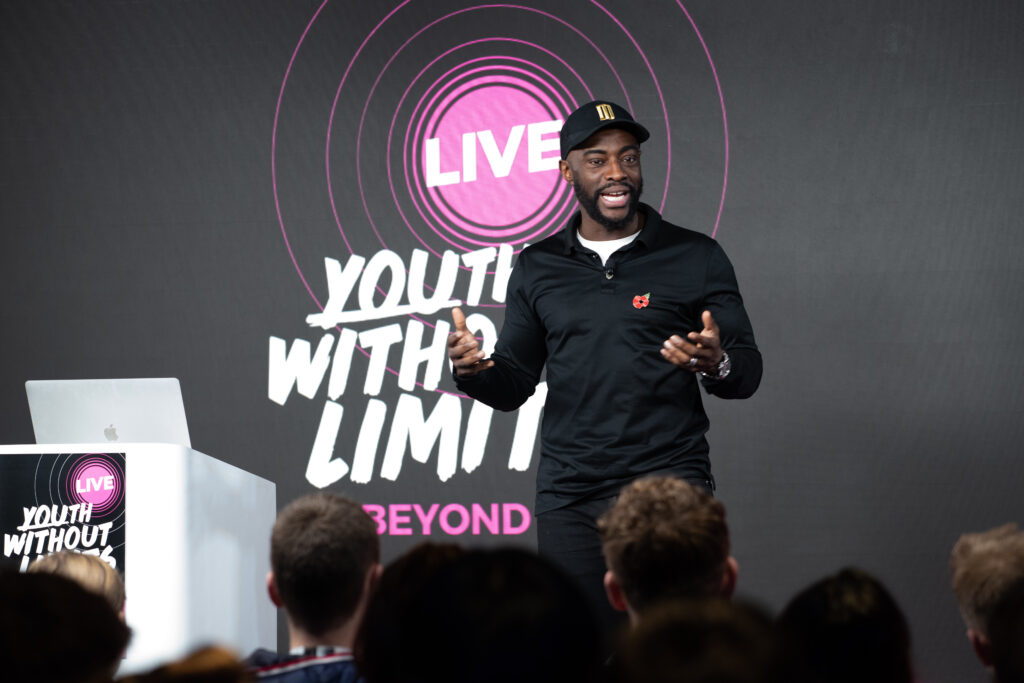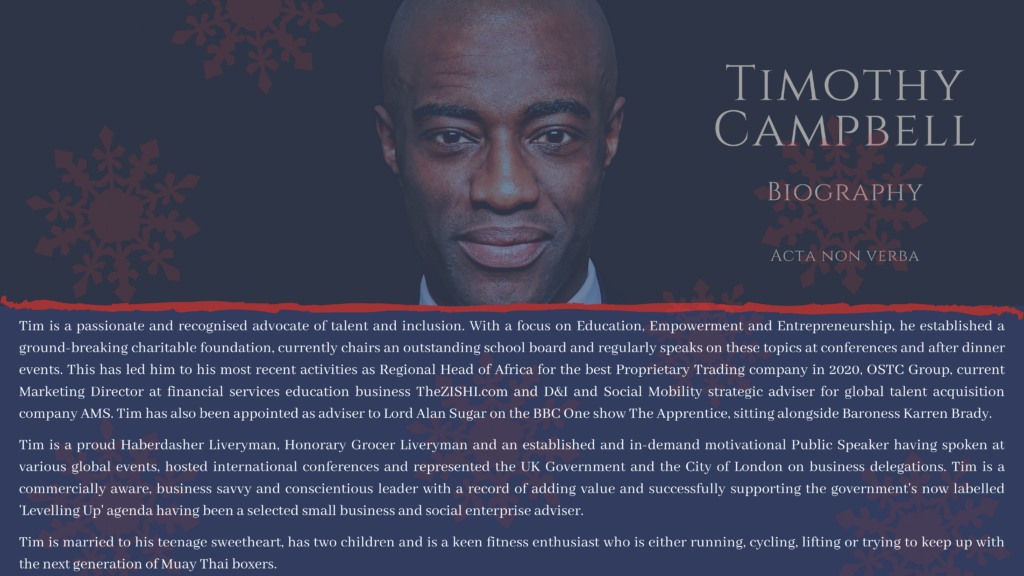Tim Campbell: “employers should look wider than just university degrees”

Tim is a passionate and recognised advocate of talent and inclusion. With a focus on Education, Empowerment and Entrepreneurship, he established a ground-breaking charitable foundation, currently chairs an outstanding school board and regularly speaks on these topics at conferences and after dinner events. This has led to his most recent activities as Regional Head of Africa for the best Proprietary Trading company in 2020, OSTC Group, current Marketing Director at financial services education business The ZISHI.com and D&I and Social Mobility strategic advisor for global talent acquisition company AMS. Tim has also been appointed as advisor to Lord Alan Sugar on the BBC One show The Apprentice, sitting alongside Baroness Karren Brady.
When it comes to careers, there are two dominant different schools of thought. There is the traditional route, which I followed: finish school, A Levels, go to university, get a degree and apply for a job. My mum was all about education, education, education and, to her, getting a degree was a clear pathway to success. And I understand that way of thinking, as it has certainly been very helpful and allowed me to climb the social mobility ladder many speak about.
The other route is going straight into work, rolling up your sleeves immediately and learning on the job. Unless you want to do something very specific – such as being a doctor for example – there are very few roles now where you can’t get the knowledge, skills and experience you need on the job.
Unfortunately, there is still too much attention being given to university degrees as the pinnacle of academic achievement when there are so many different ways people learn what they need to earn a living. We have a very antiquated way of looking at education here in the UK. Degrees are still perceived as a gold standard and the traditional academic curriculum remains king. Ask a group of parents what they hope for their children academically and the vast majority will default to good academic grades and a university degree.
I believe that employers should assess and recruit for talent potential, and not make decisions based solely from a candidate’s academic qualifications, or lack of. Because from what I see, whether they have a degree or not, in most cases you still need to spend as much time training someone on the job. And I’m clearly not alone in thinking this – a survey by PwC revealed that 75% of businesses have had to give new recruits additional training in basic skills.
When I hire new employees, I look for people with a great attitude, who are inquisitive, resilient and hungry to learn. Because I know that if they have those core life-skills I can teach them all the technical know-how they’ll need.
Studying psychology gave me very little preparation for my first foray into the world of HR, but what I learnt during part-time work opportunities and on the job has stayed with me ever since. The interpersonal skills, the ability to sell and present and being financially literate have stood me in very good stead!
We need to put much greater emphasis on non-formal enrichment activities and experiential learning – where young people learn by doing. Here at the OSTC Group in partnership with TheZISHI.com we take kids out of the classroom and give them real-life experience on the trading floor alongside targeted training solutions. I honestly believe this is the best learning we can give them. Not only are they able to put into practice what they’ve been taught in class, but they’re developing the essential interpersonal skills that they will need to succeed and thrive in the workplace later on in life. Skills such as resilience, confidence and problem-solving can’t be developed solely from the academic curriculum. That’s why opportunities like The Duke of Edinburgh’s Award are so critical, because it provides young people with all the tools and support needed to develop these essential skills.
I’m concerned that employers could be missing out on amazingly talented candidates just because they didn’t go to a university.
More importantly, they could be missing out on incredible talent from more marginalised groups, who are more likely to not attend university. The social and economic inequalities were already bad pre-pandemic, but the impact of Covid-19, coupled with the cost-of-living squeeze, have made the situation worse. A recent Teach First report stated that the Covid-19 pandemic has undone 10 years of progress in closing the attainment gap between the richest and poorest pupils. Poorer students, through no fault of their own, are now even less prepared for the world of work when they leave school than their more affluent peers. The same report revealed that over half of teachers in schools with the most disadvantaged pupils (55%) believe the pandemic has negatively affected pupils’ perceptions of their career prospects.
To those employers I would say: look wider than just a degree as, with Apprenticeships, T Levels and other qualifications, talent is not restricted to those who have letters after their name. Train them on the job. Show them how it’s done. Attract diverse young people for your strategic advantage. Their drive, determination and way of thinking is unparalleled and they can bring a huge amount to the workplace. By collaborating with young people who are hungry for the opportunities of tomorrow you will reap the rewards of this investment for many years to come.
But young people also have a role to play. The world is in a very different place to a few years ago and the change in the future of work feels like it is speeding up. Find your purpose aligned to your passion, work out what makes you want to get out of bed every morning and channel that to find your dream opportunity. This will help you learn to work smarter, rather than just harder. Some jobs have been created in the last five years that didn’t exist 10 years ago and we need you for those jobs of tomorrow. And don’t forget that there is a huge support network out there to help you succeed – charities like The Duke of Edinburgh’s Award who will do everything they can to give you the skills and experience you need to transition from education to employment and thrive in the workplace.





